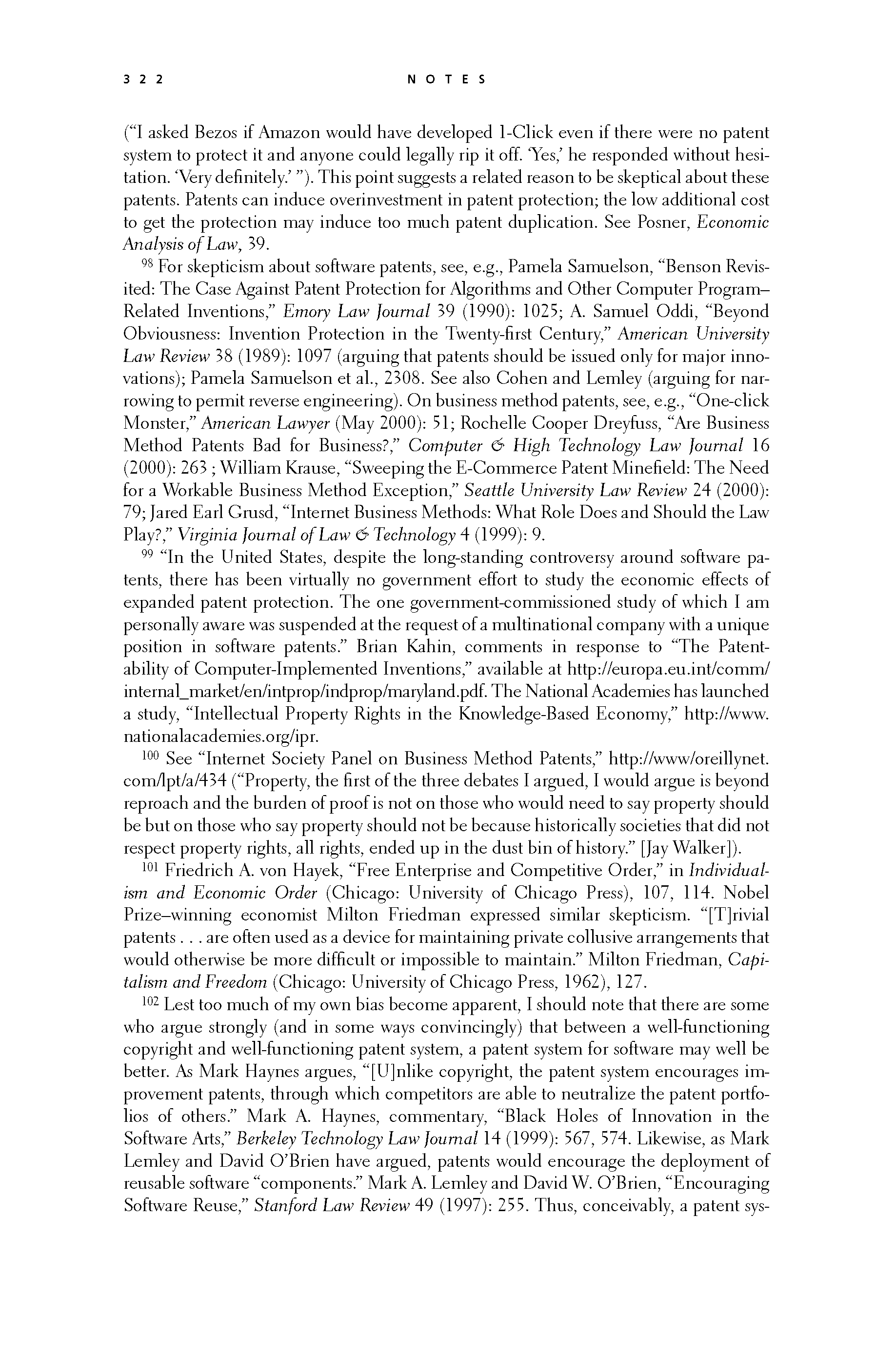 p321 _
-chap- _
toc-1 _
p322w _
toc-2 _
+chap+ _
p323
p321 _
-chap- _
toc-1 _
p322w _
toc-2 _
+chap+ _
p323
("I asked Bezos if Amazon would have developed 1-Click even if there were no patent
system to protect it and anyone could legally rip it off. 'Yes,' he responded without hesi-
tation. 'Very definitely.'"). This point suggests a related reason to be skeptical about these
patents. Patents can induce overinvestment in patent protection; the low additional cost
to get the protection may induce too much patent duplication. See Posner, _Economic_
_Analysis_of_Law,_ 39.
[11-98] For skepticism about software patents, see, e.g., Pamela Samuelson, "Benson Revis-
ited: The Case Against Patent Protection for Algorithms and Other Computer Program-
Related Inventions," _Emory_Law_Journal_ 39 (1990): 1025; A. Samuel Oddi, "Beyond
Obviousness: Invention Protection in the Twenty-first Century," _American_University_
_Law_Review_ 38 (1989): 1097 (arguing that patents should be issued only for major inno-
vations); Pamela Samuelson et al., 2308. See also Cohen and Lemley (arguing for nar-
rowing to permit reverse engineering). On business method patents, see, e.g., "One-click
Monster," _American_Lawyer_ (May 2000): 51; Rochelle Cooper Dreyfuss, "Are Business
Method Patents Bad for Business?," _Computer_&_High_Technology_Law_Journal_ 16
(2000): 263 ; William Krause, "Sweeping the E-Commerce Patent Minefield: The Need
for a Workable Business Method Exception," _Seattle_University_Law_Review_ 24 (2000):
79; Jared Earl Grusd, "Internet Business Methods: What Role Does and Should the Law
Play?," _Virginia_Journal_of_Law_&_Technology_ 4 (1999): 9.
[11-99] "In the United States, despite the long-standing controversy around software pa-
tents, there has been virtually no government effort to study the economic effects of
expanded patent protection. The one government-commissioned study of which I am
personally aware was suspended at the request of a multinational company with a unique
position in software patents." Brian Kahin, comments in response to "The Patent-
ability of Computer-Implemented Inventions," available at http://europa.eu.int/comm/
internal_market/en/intprop/indprop/maryland.pdf. The National Academies has launched
a study, "Intellectual Property Rights in the Knowledge-Based Economy," http://www.
nationalacademies.org/ipr.
[11-100] See "Internet Society Panel on Business Method Patents," http://www/oreillynet.
com/lpt/a/434 ("Property, the first of the three debates I argued, I would argue is beyond
reproach and the burden of proof is not on those who would need to say property should
be but on those who say property should not be because historically societies that did not
respect property rights, all rights, ended up in the dust bin of history." [Jay Walker]).
[11-101] Friedrich A. von Hayek, "Free Enterprise and Competitive Order," in _Individual-_
_ism_and_Economic_Order_ (Chicago: University of Chicago Press), 107, 114. Nobel
Prize-winning economist Milton Friedman expressed similar skepticism. "[T]rivial
patents... are often used as a device for maintaining private collusive arrangements that
would otherwise be more difficult or impossible to maintain." Milton Friedman, _Capi-_
_talism_and_Freedom_ (Chicago: University of Chicago Press, 1962), 127.
[11-102] Lest too much of my own bias become apparent, I should note that there are some
who argue strongly (and in some ways convincingly) that between a well-functioning
copyright and well-functioning patent system, a patent system for software may well be
better. As Mark Haynes argues, "[U]nlike copyright, the patent system encourages im-
provement patents, through which competitors are able to neutralize the patent portfo-
lios of others." Mark A. Haynes, commentary, "Black Holes of Innovation in the
Software Arts," _Berkeley_Technology_Law_Journal_ 14 (1999): 567, 574. Likewise, as Mark
Lemley and David O'Brien have argued, patents would encourage the deployment of
reusable software "components." Mark A. Lemley and David W. O'Brien, "Encouraging
Software Reuse," _Stanford_Law_Review_ 49 (1997): 255. Thus, conceivably, a patent sys-
[[322]]
p321 _
-chap- _
toc-1 _
p322w _
toc-2 _
+chap+ _
p323